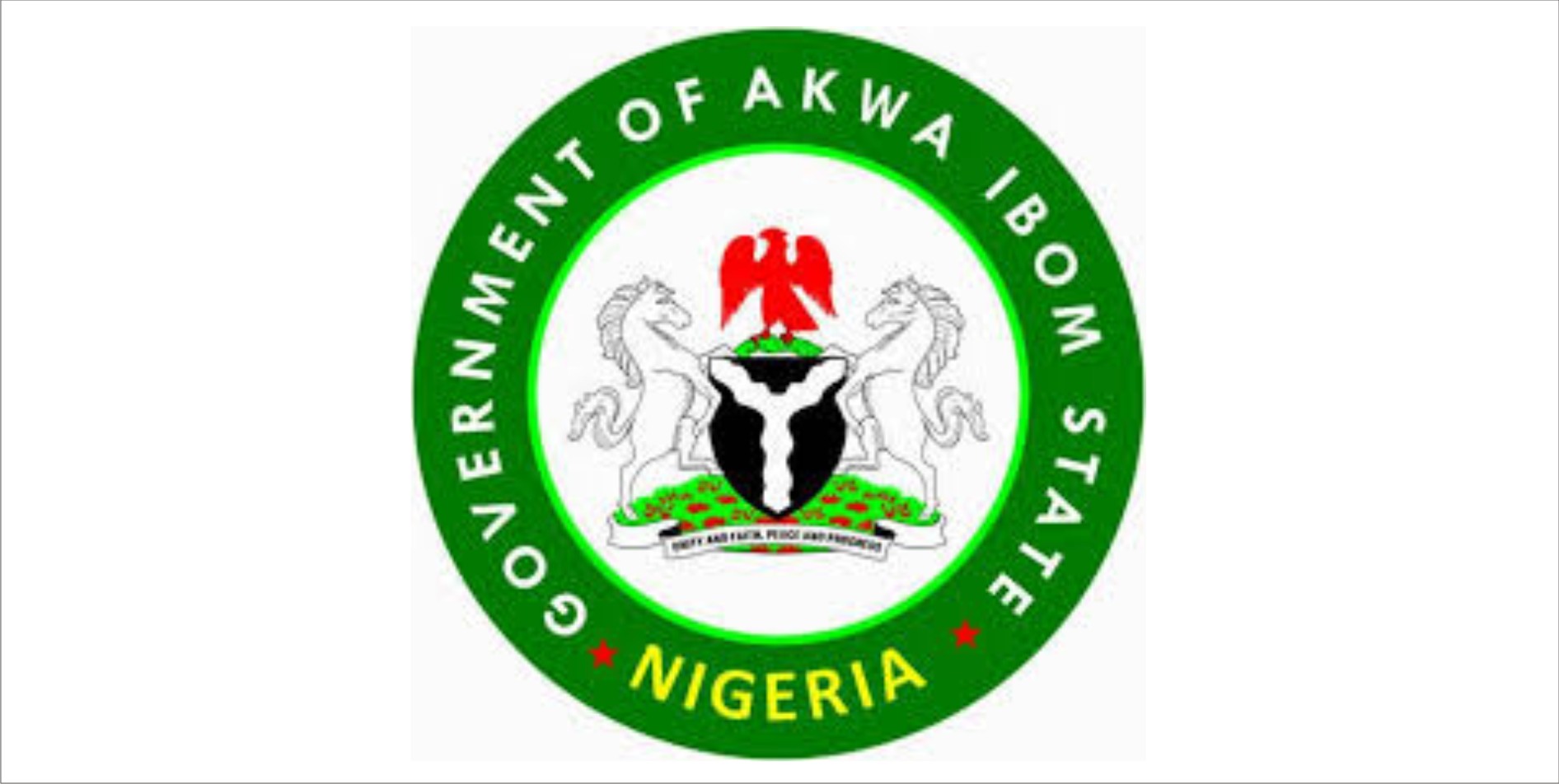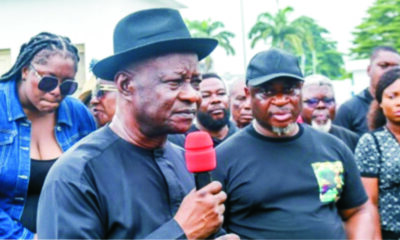Niger Delta
FG Begins Relief Materials Distribution To A’Ibom Flood Victims

The Federal Government, through the Ministry of Niger Delta Affairs, has flagged off the distribution of presidential palliatives to victims of the 2022 flood in Akwa Ibom State.
Minister of Niger Delta Affairs, Umana Umana, while handing over the relief materials to the National Emergency Management Agency (NEMA) for onward distribution to the victims in Uyo, the state capital, expressed concern that the Niger Delta region was worse hit by the flood because of its topography and location.
Umana, who was represented by a member of the Governing Board of the Niger Delta Development Commission (NDDC) for Akwa Ibom State, Dr Emem Wills, said the relief materials cannot replace the losses associated with the flood, but they would help to alleviate the burden faced by the people.
He said the gesture was not just a physical distribution of the materials, but also the compassion and empathy of the government towards the affected people.
“We are aware that no amount of relief provided by the government can replace the losses as a result of the flood. However, it is our candid belief that the relief items will help alleviate the burden currently faced by our people.
“This gesture is not just a physical distribution of materials, rather it represents the compassion and empathy of the government towards its people”, the Minister said.
He disclosed that the communities highly affected by the flood have already been identified by the NEMA through the Needs Assessment conducted after the flood, adding that the identified communities have been listed to benefit from the relief materials.
Speaking after the handover ceremony, the Director-General of NEMA, Alh. Ahmed Habib, while appreciating the Federal Government for the gesture, assured that the items would be distributed only to those who were truly affected by the 2022 flood.
The DG, who was represented by Demien Egwu, lamented that the Niger Delta has been a collection centre of water-related activities from the North down to the South.
“The Niger Delta is always exposed to flooding and other attendant effects of flooding because it is the collection centre of all water-related activities from the North down to the South and anytime this happens, there is a need for a recovery process.
He thanked the President, Muhammadu Buhari, for his magnanimity and support of the people of the Niger Delta.
“I want to assure the minister that these items will be distributed to those who were truly affected by the 2022 flood. We will do this in conjunction with the Akwa Ibom State Management Agency and other relevant stakeholders”, the DG said.
The materials approved for distribution include mattresses, pillows, blankets, cartons of noodles, bags of rice and beans, grinding machines, cement, roofing sheets, ceiling boards, and others.
Niger Delta
Ewhrudjakpo Counsels New Couples On Faith In God

Newly married couples have been advised to build their matrimonial homes on faith in God and trust each other for their marriages to stand the test of time.
Bayelsa State Deputy Governor, Senator Lawrence Ewhrudjakpo, gave the advice, weekend during a wedding reception in honour of former Miss Sophia Oguru, daughter of former Secretary to the State Government, Professor Edmund Allison-Oguru, and her heartthrob, Mr. Daniel David.
Speaking as Special Guest of Honour at the event held at the Golden Tulip Hotel, Onopa, Yenagoa, Senator Ewhrudjakpo described matrimony as one of the most important sacraments of the church, noting that it was the first social institution established by God at creation.
While drawing attention to the fact that the first public miracle performed by the Lord Jesus took place at a marriage ceremony, he called on Mr Daniel David and his wife not to lose sight of the fact that the family is the first place of worship of God.
In a statement issued by his media aide, MrDoubaraAtasi, on Sunday, the Deputy Governor further admonished the couple to avoid absolving themselves of blame when wronged, being unnecessarily accusative and abusive, saying that doing so could ruin their relationship.
Ewhrudjakpo also charged them to imbibe politeness, patience, trust for each other, and prayerfulness as a habit for their life-long journey of marriage to be truly successful.
Speaking earlier as Chairman of the occasion, the former Deputy Governor of the state, Rear Admiral Gboribiogha John Jonah (Rtd.), noted that no couple was perfect, and advised the newly weds to make tolerance their watchword.
Rear Admiral Jonah, who is also the Chairman of Bayelsa Elders Council, congratulated the young couple and prayed God to guide them all through their marital journey.
Also speaking, Father of the Bride and former Secretary to the State Government, Professor Oguru, thanked all the guests for honoring the invitation to the reception.
Professor Oguru, who particularly expressed gratitude to the Deputy Governor, and the Chairman of the occasion, Rear Admiral Jonah, said it gave him joy to witness the wedding of two of his daughters in a space of one year.
The Secretary to the State Government, Professor NimibofaAyawei, and the Commissioner in charge of Media and Publicity at the Bayelsa State Independent Electoral Commission, BYSIEC, Hon. Osomu Elliot, were among other dignitaries who graced the occasion.
By: AriweraIbibo-Howells, Yenagoa
Niger Delta
Traditional Rulers Council Honours Two Commissioners

The Usomini Council of Traditional Rulers in Ogba/Egbema/Ndoni Local Government Area of Rivers State, has bestowed prestigious traditional titles on two Commissioners currently serving in the State Executive Council in the State for their contributions to the development of the State and their local government as well as the Usomini community. They are Commissioner for Urban Development and Physical Planning, Hon Isaac Umejuru; and the Commissioner for Health, Dr Adaeze Oreh.
While Hon Umejuru was honoured with the chieftaincy title of Eze Chi na Chi 1 of Ogbaland, Dr Oreh was conferred with the title of Ugo Nwanyibueze.
The epoch-making ceremony was held recently in Obirikom Community, all attracted people from all walks of life.The event coincided with the grand reception organised by the Usomini community in honour of the two Commissioners, who all hail from State Constituency 1 in ONELGA.
Speaking at the event, EzeUsomini, Eze Allen Osoh said the Usomini traditional rulers council was elated over the appointment of its illustrious son and daughter into the State cabinet by Governor SiminalayiFubara, describing them as good and worthy ambassadors of the area.
He expressed gratitude to the Governor for the award of the contract for the construction of Igiri-Ubomini-Egbeda-Elele road project, which he noted would bring the much-desired development to the area.
The traditional ruler, however, pleaded with Governor Fubara to consider the award of contract for the construction of Usomini internal roads in order to alleviate the suffering of the people, particularly in transporting their agricultural produce to the urban area.
The Eze Ali Usominill of Ogbaland also made a passionate appeal to the Governor for the upgrading of the Usomini traditional stool to first class status.
Earlier, the Commissioner for Urban Development and Physical Planning, Hon Isaac Umejuru had expressed delight over the honour done him by his people, stressing that Governor Fubara would carry ONELGA along in the development agenda of his administration.
Umejuru, who is a former caretaker committee chairman of the local government council said peace, brotherhood and good tidings would come to his people for choosing the right path, contending that the governor would successfully rule for eight years like his predecessors so that the dividends of democracy would get to the people.
According to him, God would not allow anybody’s evil imagination to thwart the eight years tenure of the Governor.
“We have chosen the right path.The path to peace. Governor Fubara, our dear son will rule Rivers State for eight years and the dividends of democracy will come to us.God will not any evil to thwart it.Dr Peter Odili who owns the original political structures in the State did not fight anybody.Nobody fought the other governors after him.Would you want our son to leave office barely after five months? It is not possible.I will take this message to the governor and will tell him that my people said that anybody against him is an enemy of Rivers State “, he said.
On her part, the Commissioner for Health, DrAdaezeOreh thanked the Usomini traditional rulers council for finding her worthy of the honour.
DrOreh, who was represented at the occasion, said she does everything within her reach to promote peace and progress in Usomini community, and noted her willingness to always take Usomini as part of her home, and regretted her inability to physically grace the event due to official engagements.
Niger Delta
A’Ibom Targets 600,000 Households For Intervention Programmes

The Akwa Ibom State Government says about 600,000 households have been captured in the social register for its various intervention programmes aimed at ameliorating economic hardship.
The Commissioner for Economic Development, Mr Emem Bob, said this during the ministerial briefing in Uyo on Monday.
The Tide’s source reports that the ministerial briefing is tagged; “ARISE Score Card’’, with the theme “Food Sufficiency and Security: The Intervention and Sustainability Strategy of Governor Umo Eno”.
Bob said though the state Social Register had increased to 2.3 million people, government was reaching out to the vulnerable poor through 600,000 households captured in the social register.
“The social register is well-structured. It’s structured in such a way that we have broken the villages, wards and Local Government Areas.
“These make up the state social register and the total number of people we have in the social register is 2.3 million.
“When you talk about households, we have about 600,000 households in the social register and that is what we have been using for various interventions in the state”, Bob said.
The Commissioner said the process for selection into the social register was very clear and transparent.
He said the social register had been there for the past eight years, saying that the Governor only ordered that it should be expanded to accommodate those who had fallen under the poverty line.
“How people are selected for the social register is very clear. It is a very transparent process in the sense that there is what we call ‘Community Based Targeting’.
“Don’t forget that anything that involves the World Bank is very transparent; they are thorough.
“Community Based Targeting is what was used for social register and we have State Organising Coordinating Units which work with the National Social Safety Nets Coordinator Unit in Abuja.
“They work together and they have staff across the local governments. They go to villages, meet with village heads to pick these people”, he said.
The Commissioner for Agriculture, DrOffiongOfor, said the State Government had put in place a lot of intervention programmes to boost food production and reduce the prices of foodstuffs in the state.
Offor urged the people to heed to the governor’s call and return to farming, saying that farmers should form themselves into cooperative groups for easy accessibility.
“Food sustainability remains the priority of Gov. Eno’s administration. The first thing is that the Ministry of Agriculture merged with the Ministry of Rural Development which also has a component of cooperatives.
“This was deliberate because the cooperative system is the system that is driving food productivity anywhere in the world”, Offor said.
-
Business2 days ago
Naira Rebound, Air Peace’s Expansion Deepens International Route Competition
-
Politics2 days ago
Sheathe Your Sword Against Fubara’s Govt, Monarch Tells Wike, Others
-

 News2 days ago
News2 days agoResign Honourably, PDP Tells Emeka Woke
-

 News2 days ago
News2 days agoNDA Alerts Kaduna Communities Ahead Of Shooting Practice
-
Focus2 days ago
Dissecting Benefits, Opportunities, Challenges Of PH Ring Road
-
Business2 days ago
NSIB, AAAU Sign MoU On Air Safety Training
-

 Politics2 days ago
Politics2 days agoKano High Court Voids Ganduje’s APC Membership
-

 News2 days ago
News2 days agoJunior Pope: Precious Ofurum’ll Get Deserved Honour, Fubara Assures

